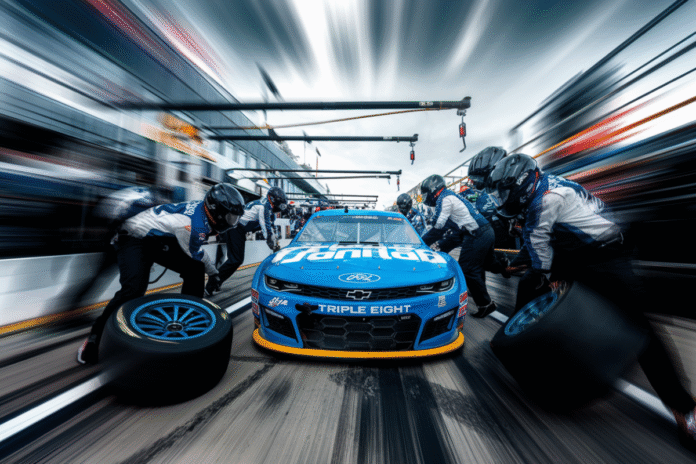“The world of NASCAR is unlike anything else in motorsport,” says a seasoned mechanic. As the popularity of stock car racing continues to surge, teams are looking beyond their borders for inspiration and expertise. In a bold move, a renowned supercar team has sent five of its mechanics to the United States, immersing them in the unique culture and technical demands of NASCAR. This initiative raises questions about the evolving landscape of motorsport and how cross-pollination of ideas could shape the future of racing.
The stakes are high for teams eager to enhance their performance on the track. NASCAR, known for its high-speed action and strategic pit stops, offers a different set of challenges compared to traditional supercar racing. The mechanics will not only observe but also engage with top teams, gaining insights into their methodologies and technologies. This venture could lead to significant advancements in efficiency and strategy for their home team, potentially giving them a competitive edge in future races.
Exploring the Nascar Culture
NASCAR is more than just a racing series; it embodies a unique culture that intertwines tradition, community, and high-octane excitement. For the mechanics from the supercar team, experiencing this culture firsthand is invaluable. They will witness the electric atmosphere of race day, where fans rally in massive numbers, showcasing their unwavering support for their favorite drivers. The camaraderie among teams and the fierce competition on the track create an environment unlike any other in motorsport.
One of the most striking aspects of NASCAR is its emphasis on teamwork and precision. The mechanics will observe how pit crews operate under immense pressure, executing tire changes and repairs in mere seconds. This level of efficiency is crucial in a sport where every second counts. By understanding these dynamics, the mechanics can bring back innovative practices that could enhance their own team’s performance during pit stops and overall race strategy.
Furthermore, the mechanics’ immersion into the NASCAR world allows them to grasp the technical specifications that differentiate NASCAR vehicles from supercars. The focus on aerodynamics, engine performance, and tire management presents a wealth of knowledge that can be adapted to improve their racing techniques back home. This exchange of ideas will not only benefit the mechanics but could also elevate the entire team’s competitive standing.
Technical Insights From the Pit Lane
The technical intricacies of NASCAR are a treasure trove for any racing mechanic. Each vehicle is engineered for optimal performance under the specific conditions of oval tracks, which differ significantly from the circuits typically raced by supercars. The mechanics will have the opportunity to study the unique setups and adjustments that teams make to their cars, particularly in terms of suspension and weight distribution.
For instance, NASCAR vehicles are designed to maintain stability at high speeds, necessitating a different approach to tuning and adjustments compared to supercars. By understanding these differences, the mechanics can apply similar principles to their own vehicles, potentially leading to breakthroughs in handling and speed. The hands-on experience gained during this mission will enable them to implement new strategies and modifications upon their return.
Moreover, the mechanics will gain insights into the latest technologies being utilized in NASCAR, such as telemetry and data analysis. These tools play a crucial role in optimizing vehicle performance and strategizing during races. By acquiring knowledge on how to leverage data effectively, the mechanics can enhance their team’s decision-making processes, leading to improved outcomes on the track.
Implications for the Supercar Team
The decision to send mechanics to NASCAR is not merely an exploratory mission; it has far-reaching implications for the supercar team. By integrating the knowledge and experiences gained from this trip, the team can refine its approach to racing, potentially leading to improved performance in upcoming competitions. The infusion of new ideas can foster innovation within the team, encouraging a culture of continuous improvement.
Additionally, this venture could strengthen relationships with NASCAR teams, opening doors for future collaborations and partnerships. Networking within the NASCAR community can lead to shared resources and insights that benefit both parties. Such alliances can be instrumental in advancing technology and strategies that enhance overall racing performance.
Ultimately, the mechanics’ experience in NASCAR may also inspire a shift in the team’s overall philosophy towards racing. Emphasizing the importance of adaptability and learning from different racing disciplines can cultivate a more versatile and resilient team. This mindset could be the key to staying competitive in an ever-evolving motorsport landscape.
Looking Ahead: the Future of Motorsport
The cross-pollination of ideas between different racing series is becoming increasingly common as teams seek to push the boundaries of performance. The mechanics’ journey into the world of NASCAR exemplifies this trend, highlighting the importance of learning from diverse racing environments. As motorsport continues to evolve, such initiatives will likely become more prevalent, fostering innovation and collaboration across the industry.
For the supercar team, the insights gained from this mission could serve as a catalyst for future success. By embracing the lessons learned from NASCAR, they can adapt their strategies and technologies to meet the challenges of their own racing series. This adaptability will be crucial as they navigate the complexities of competition in an ever-changing landscape.
As the mechanics return from their mission, the anticipation builds around how their newfound knowledge will influence their team’s performance. The potential for enhanced efficiency, innovative strategies, and improved teamwork could set the stage for a new era of success in supercar racing. The journey into NASCAR is just the beginning, and the future looks promising for those willing to learn and adapt.


